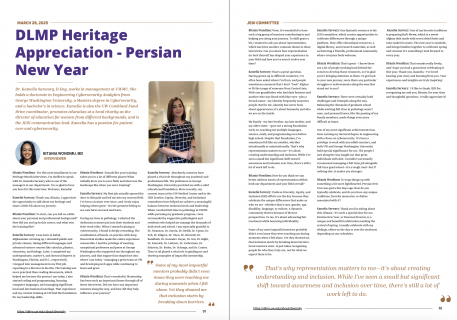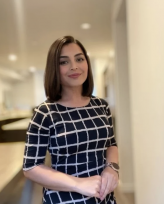DLMP Heritage Appreciation - Persian New Year
March 28, 2025

Interview by Bitania Wondimu, MD
Dr. Kamelia Sarwary, D.Eng, works in management at UWMC. She holds a doctorate in Engineering Cybersecurity Analytics from George Washington University, a Masters degree in Cybersecurity, and a bachelor's in science. Kamelia is also the UW Combined Fund Drive coordinator, promotes education at a local charity as the director of education for women from different backgrounds, and is the JEDI communication lead. Kamelia has a passion for patient care and cybersecurity.

Bitania Wondimu: For this next installment in our Heritage Month interviews, I’m thrilled to speak with Dr. Kamelia Sarwary who is one of the managers in our department. I’m so glad to have you here for this interview. Welcome, Kamelia!
Kamelia Sarwary: Thank you, Bitania. I appreciate the opportunity to talk about my heritage and share a little bit about my journey.
Bitania Wondimu: To start, can you tell us a little about your personal and professional background? How did you end up in this career, and what was the training like?
Kamelia Sarwary: I was born in Kabul, Afghanistan. Growing up, I attended public and private classes, taking different languages and advanced science courses like calculus, physics, chemistry, and biology. Later, I completed my undergraduate, master's, and doctoral degrees in Washington, Florida, and D.C., respectively.
I stepped into management in my first job, reporting to a director in his 80s. The training was more practical than reading documents, which helped me become the person I am today. I also started coding and programming, learning computer languages, and managing significant local and international meetings. That experience and my current training at UW laid the foundation for my leadership skills.
Bitania Wondimu: Sounds like your training taken you to a lot of different places! What initially drew you to your field, and what was the landscape like when you were training?
Kamelia Sarwary: My first job actually opened the door to this path and led me into my current field. I've been a trainer ever since, and I truly enjoy helping others grow—it’s the greatest feeling to see new hires succeed and learn.
During my time in pathology, I admired the dedication trainers put into their students and their work ethic. When I started training in cybersecurity, I found it deeply rewarding. The combination of hands-on practice with deep theoretical studies made the entire experience memorable. I had the privilege of meeting exceptional professors and peers at George Washington who supported me throughout my journey, and that support has shaped me into where I am today—managing a great team at UW and developing web apps while continuing to learn and grow.
Bitania Wondimu: That’s wonderful. Mentorship has been such an important theme through all of these interviews. Did you have any important mentors along the way, and how did they help influence your journey?
Kamelia Sarwary: Absolutely, mentors have played a vital role throughout my academic and professional life. The professors at George Washington University provided me with a solid educational foundation. More recently, my current team at the UW Medical Center and in the JEDI (Justice, Equity, Diversity, and Inclusion) committees have helped me achieve a meaningful balance between technical work and leadership. When I worked full-time in pathology at UWMC while pursuing my graduate program, I was surrounded by supportive pathologists and residents who helped me manage the demands of both work and school. I am especially grateful to Dr. Swanson, Dr. Garcia, Dr. Reddi, Dr. Upton, Dr. Yeh, Dr. Kilgore, Dr. Chen, Dr. Ricciotti, Dr. Bandhish, Dr. Gonzalez-Guyar, Dr. Gui, Dr. Right, Dr. Konnick, Dr. Latimer, Dr. Lieberman, Dr. Schrietz, Dr. Reder, Dr. Schrage, and Dr. Coates. They’ve all played a vital role in guiding me and showing examples of impactful mentorship.

Bitania Wondimu: Wow, it’s wonderful to have such a big group of mentors contributing to and helping you along your journey. To shift gears a bit, I wanted to ask you about representation, which has been another common theme in these interviews. Can you share how representation (or lack thereof) has shaped your experience in your field and how you’ve seen it evolve over time?
Kamelia Sarwary: That’s a great question. Having grown up in different countries, I’ve often been asked where I’m from, and people sometimes comment that I don’t "look" Afghan or fit the image of someone from Central Asia. With one grandfather who had dark features and another who was blond with blue eyes—plus a French name—my identity frequently surprises people. But for me, identity has never been about appearances; it’s about humanity and who we are on the inside.
My family—my late brother, my late mother, and my older sister —gave me a strong foundation early on, teaching me multiple languages, science, math, and programming even before high school. Despite that foundation, I’ve sometimes felt like an outsider, whether intentionally or unintentionally. That’s why representation matters to me—it’s about creating understanding and inclusion. While I’ve seen a small but significant shift toward awareness and inclusion over time, there’s still a lot of work left to do.
Bitania Wondimu: How do you think we can better address issues of representation within both our department and your field overall?
Kamelia Sarwary: I believe Diversity, Equity, and Inclusion (DEI) efforts are the key because they celebrate the unique differences that make us who we are—whether that’s race, gender, age, disability, language, or culture. A dynamic community thrives because of diverse perspectives. To me, it’s about advancing fair treatment while honoring individuality.
Some of my most impactful mentors probably didn’t even know they were teaching me during moments when I felt alone. Yet they showed me that inclusion starts by breaking down barriers. Great mentors exist—it just takes recognizing people for who they truly are, not for what we expect them to be.
One fantastic resource is the JEDI committee, which creates opportunities to celebrate differences through a unique platform. They offer educational resources, a digital library, and research materials, as well as fostering a friendly, professional community where everyone feels welcome.
Bitania Wondimu: That’s great - I know there are a lot of people working hard behind the scenes to develop those resources, so I’m glad you’re bringing attention to them. To get back to your own journey, were there any particular struggles or achievements along the way that stand out to you?
Kamelia Sarwary: There were certainly both challenges and triumphs along the way. Balancing the demands of graduate school while working full-time in pathology wasn’t easy, and personal losses, like the passing of my family members, made things even more difficult at times.
One of my most significant achievements has been earning my doctoral degree in engineering with a focus on cybersecurity. It’s been a privilege to work with incredible mentors, and both UW and George Washington University hold special significance for me. The people I met along the way taught me that great individuals still exist. I wouldn’t necessarily recommend managing a full-time job alongside full-time grad school—it’s a tough road—but if nothing else, it makes you stronger.
Bitania Wondimu: To wrap things up with something a bit more lighthearted, Persian New Year was just a few days ago. How do you typically celebrate, and do you have any unique traditions, favorite memories, or dishes associated with it?
Kamelia Sarwary: Thank you for asking about this, Bitania—it’s such a special time for me. Persian New Year, or Nowrooz/Nowruz, is a unique and beautiful celebration marking the arrival of spring. I usually celebrate with my siblings, either on the day or over the weekend, depending on our schedules.
One of my favorite traditions is preparing Haft-Mewa, which is a sweet Afghan dish made with seven dried fruits and nuts soaked in water. The new year is symbolic, and brings families together to celebrate spring and renewal. It’s something I look forward to every year.
Bitania Wondimu: That sounds really lovely, and I hope you had a great time celebrating it this year. Thank you, Kamelia—I’ve loved hearing your story and learning from you. Your experiences and insights are truly inspiring!
Kamelia Sarwary: I’d like to thank JEDI for recognizing me and you, Bitania, for your time and thoughtful questions. I really appreciate it!
